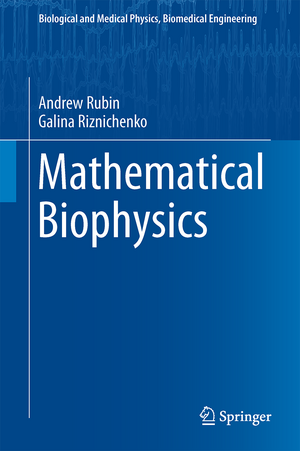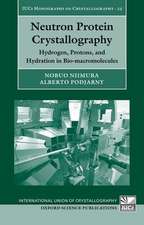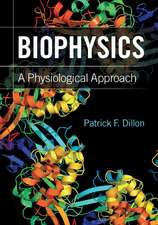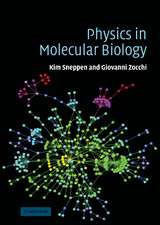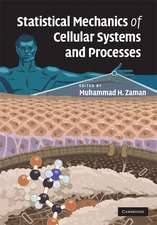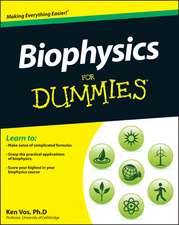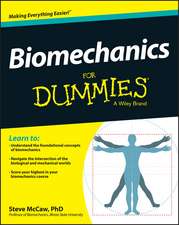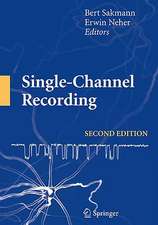Mathematical Biophysics: Biological and Medical Physics, Biomedical Engineering
Autor Andrew Rubinen Limba Engleză Hardback – 26 noi 2013
| Toate formatele și edițiile | Preț | Express |
|---|---|---|
| Paperback (1) | 640.24 lei 6-8 săpt. | |
| Springer Us – 23 aug 2016 | 640.24 lei 6-8 săpt. | |
| Hardback (1) | 651.51 lei 6-8 săpt. | |
| Springer Us – 26 noi 2013 | 651.51 lei 6-8 săpt. |
Din seria Biological and Medical Physics, Biomedical Engineering
- 5%
 Preț: 1110.32 lei
Preț: 1110.32 lei - 18%
 Preț: 1006.55 lei
Preț: 1006.55 lei - 18%
 Preț: 960.78 lei
Preț: 960.78 lei - 18%
 Preț: 704.11 lei
Preț: 704.11 lei - 18%
 Preț: 967.40 lei
Preț: 967.40 lei - 18%
 Preț: 948.92 lei
Preț: 948.92 lei - 15%
 Preț: 641.71 lei
Preț: 641.71 lei - 15%
 Preț: 644.95 lei
Preț: 644.95 lei - 15%
 Preț: 665.08 lei
Preț: 665.08 lei - 18%
 Preț: 1669.16 lei
Preț: 1669.16 lei - 18%
 Preț: 941.05 lei
Preț: 941.05 lei - 18%
 Preț: 956.81 lei
Preț: 956.81 lei - 18%
 Preț: 950.21 lei
Preț: 950.21 lei - 15%
 Preț: 636.80 lei
Preț: 636.80 lei - 18%
 Preț: 947.50 lei
Preț: 947.50 lei - 15%
 Preț: 636.80 lei
Preț: 636.80 lei -
 Preț: 397.01 lei
Preț: 397.01 lei - 18%
 Preț: 1236.99 lei
Preț: 1236.99 lei - 15%
 Preț: 644.49 lei
Preț: 644.49 lei - 18%
 Preț: 946.55 lei
Preț: 946.55 lei - 15%
 Preț: 712.22 lei
Preț: 712.22 lei - 18%
 Preț: 952.89 lei
Preț: 952.89 lei - 18%
 Preț: 944.36 lei
Preț: 944.36 lei - 18%
 Preț: 1228.29 lei
Preț: 1228.29 lei - 5%
 Preț: 1422.67 lei
Preț: 1422.67 lei - 18%
 Preț: 1393.27 lei
Preț: 1393.27 lei - 15%
 Preț: 651.19 lei
Preț: 651.19 lei - 18%
 Preț: 953.65 lei
Preț: 953.65 lei - 18%
 Preț: 955.88 lei
Preț: 955.88 lei - 15%
 Preț: 644.95 lei
Preț: 644.95 lei - 5%
 Preț: 1098.48 lei
Preț: 1098.48 lei - 18%
 Preț: 959.19 lei
Preț: 959.19 lei - 15%
 Preț: 643.65 lei
Preț: 643.65 lei - 5%
 Preț: 1159.16 lei
Preț: 1159.16 lei - 5%
 Preț: 1102.67 lei
Preț: 1102.67 lei - 18%
 Preț: 952.09 lei
Preț: 952.09 lei - 18%
 Preț: 946.55 lei
Preț: 946.55 lei - 18%
 Preț: 952.09 lei
Preț: 952.09 lei - 15%
 Preț: 703.20 lei
Preț: 703.20 lei - 18%
 Preț: 953.65 lei
Preț: 953.65 lei - 5%
 Preț: 1008.45 lei
Preț: 1008.45 lei - 15%
 Preț: 644.82 lei
Preț: 644.82 lei - 18%
 Preț: 956.03 lei
Preț: 956.03 lei - 15%
 Preț: 647.40 lei
Preț: 647.40 lei
Preț: 651.51 lei
Preț vechi: 766.49 lei
-15% Nou
Puncte Express: 977
Preț estimativ în valută:
124.67€ • 133.31$ • 103.94£
124.67€ • 133.31$ • 103.94£
Carte tipărită la comandă
Livrare economică 18 aprilie-02 mai
Preluare comenzi: 021 569.72.76
Specificații
ISBN-13: 9781461487012
ISBN-10: 1461487013
Pagini: 325
Ilustrații: XV, 273 p. 150 illus., 43 illus. in color.
Dimensiuni: 155 x 235 x 20 mm
Greutate: 0.73 kg
Ediția:2014
Editura: Springer Us
Colecția Springer
Seria Biological and Medical Physics, Biomedical Engineering
Locul publicării:New York, NY, United States
ISBN-10: 1461487013
Pagini: 325
Ilustrații: XV, 273 p. 150 illus., 43 illus. in color.
Dimensiuni: 155 x 235 x 20 mm
Greutate: 0.73 kg
Ediția:2014
Editura: Springer Us
Colecția Springer
Seria Biological and Medical Physics, Biomedical Engineering
Locul publicării:New York, NY, United States
Public țintă
ResearchCuprins
Preface.- Part I Basic models in mathematical biophysics.- Chapter 1 Growth and catalysis models.- Chapter 2 Oscillations, rhythms and chaos in biological systems.- Chapter 3 Spatiotemporal self-organization of biological systems.- Chapter 4 Model of the impact of a weak electric field on the nonlinear system of trans-membrane ion transport.- Part II Models of complex systems.- Chapter 5 Oscillations and periodic space structures of pH and electric potential along the cell membrane of algae Chara corallina.- Chapter 6 Models of Morphogenesis.- Chapter 7 Autowave processes, nerve pulse propagation, and heart activity.- Chapter 8 Nonlinear models of DNA dynamics.- Part III Kinetic models of photosynthetic processes.- Chapter 9 Models of photosynthetic electron transport. Electron transfer in a multienzyme complex.- Chapter 10 Kinetic model of interaction of two photosystems.- Chapter 11 Detailed model of electron transfer in PSII.- Chapter 12 Generalized kinetic model of primary photosynthetic processes.- Part IV Direct multiparticle models of processes in subcellular systems.- Chapter 13 Method of direct multiparticle simulation of protein interactions.- Chapter 14 Modeling of protein complex formation in solution with diffusion and electrostatic interactions.- Chapter 15 Modeling of protein interactions in photosynthetic membrane.- Chapter 16 Spaciotemporal evolution of electrochemical potential ΔμH+ in photosynthetic membrane.- Conclusion.- References.- Index.
Textul de pe ultima copertă
This book presents concise descriptions and analysis of the classical and modern models used in mathematical biophysics. The authors ask the question "what new information can be provided by the models that cannot be obtained directly from experimental data?" Actively developing fields such as regulatory mechanisms in cells and subcellular systems and electron transport and energy transport in membranes are addressed together with more classical topics such as metabolic processes, nerve conduction and heart activity, chemical kinetics, population dynamics, and photosynthesis. The main approach is to describe biological processes using different mathematical approaches necessary to reveal characteristic features and properties of simulated systems. With the emergence of powerful mathematics software packages such as MAPLE, Mathematica, Mathcad, and MatLab, these methodologies are now accessible to a wide audience.
- Provides succinct but authoritative coverage of a broad array of biophysical topics and models
- Written by authors at Moscow State University with its strong tradition in mathematics and biophysics
- Scope, coverage, and length make the book highly suitable for use in a one-semester course at the senior undergraduate/graduate level
Caracteristici
Provides succinct but authoritative coverage of a broad array of biophysical topics and models Written by authors at Moscow State University with its strong tradition in mathematics and biophysics Scope, coverage, and length make the book highly suitable for use in a one-semester course at the senior undergraduate/graduate level
